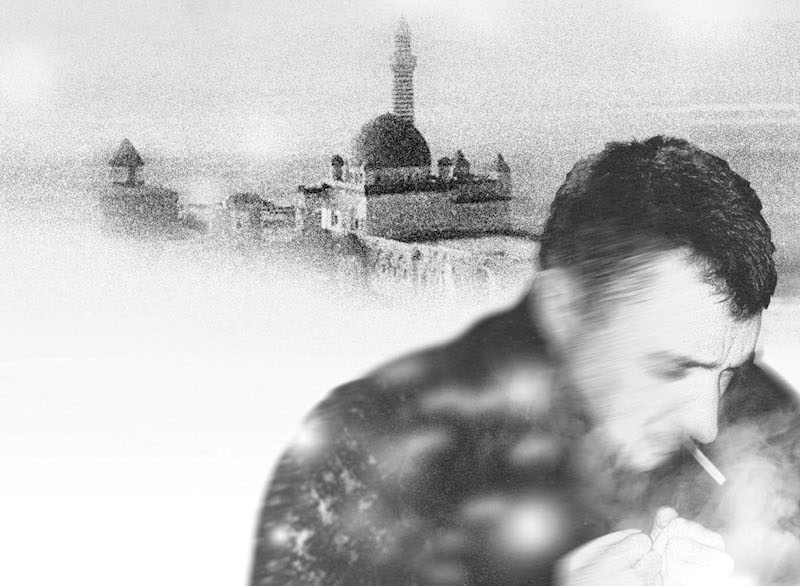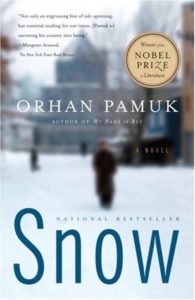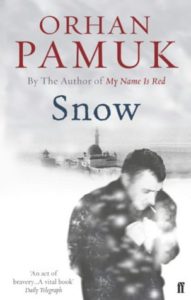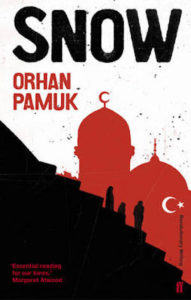

“This seventh novel from the Turkish writer Orhan Pamuk is not only an engrossing feat of tale-spinning, but essential reading for our times.
In Turkey, Pamuk is the equivalent of rock star, guru, diagnostic specialist and political pundit: the Turkish public reads his novels as if taking its own pulse … He deserves to be better known in North America, and no doubt he will be, as his fictions turn on the conflict between the forces of ‘Westernization’ and those of the Islamists. Although it’s set in the 1990’s and was begun before Sept. 11, Snow is eerily prescient, both in its analyses of fundamentalist attitudes and in the nature of the repression and rage and conspiracies and violence it depicts.
…
“Like Pamuk’s other novels, Snow is an in-depth tour of the divided, hopeful, desolate, mystifying Turkish soul. It’s the story of Ka, a gloomy but appealing poet who hasn’t written anything in years. But Ka is not his own narrator: by the time of the telling he has been assassinated, and his tale is pieced together by an ‘old friend’ of his who just happens to be named Orhan. As the novel opens, Ka has been in political exile in Frankfurt, but has returned to Istanbul after 12 years for his mother’s funeral. He’s making his way to Kars, an impoverished city in Anatolia, just as a severe snowstorm begins … Cut off from escape by the snow, Ka wanders through a decaying city haunted by its glorious former selves: there are architectural remnants of the once vast Ottoman Empire … Ka’s pose as a journalist allows Pamuk to put on display a wide variety of opinions. Those not living in the shrunken remains of former empires may find it hard to imagine the mix of resentful entitlement (We ought to be powerful!), shame (What did we do wrong?), blame (Whose fault is it?) and anxiety about identity (Who are we really?) that takes up a great deal of headroom in such places, and thus in Snow.
…
“The twists of fate, the plots that double back on themselves, the trickiness, the mysteries that recede as they’re approached, the bleak cities, the night prowling, the sense of identity loss, the protagonist in exile — these are vintage Pamuk, but they’re also part of the modern literary landscape. A case could be made for a genre called the Male Labyrinth Novel, which would trace its ancestry through De Quincey and Dostoyevsky and Conrad, and would include Kafka, Borges, García Márquez, DeLillo and Auster, with the Hammett-and-Chandler noir thriller thrown in for good measure. It’s mostly men who write such novels and feature as their rootless heroes, and there’s probably a simple reason for this: send a woman out alone on a rambling nocturnal quest and she’s likely to end up a lot deader a lot sooner than a man would.
…
“If Ka were to run true to the form of Pamuk’s previous novels, he might take refuge in stories. Stories, Pamuk has hinted, create the world we perceive: instead of ‘I think, therefore I am,’ a Pamuk character might say, ‘I am because I narrate.’ It’s the Scheherazade position, in spades. But poor murdered Ka is no novelist: it’s up to ‘Orhan’ to act as his Horatio
Snow is the latest entry in Pamuk’s longtime project: narrating his country into being. It’s also the closest to realism. Kars is finely drawn, in all its touching squalor, but its inhabitants resist ‘Orhan’s’ novelizing of them. One of them asks him to tell the reader not to believe anything he says about them, because ‘no one could understand us from so far away.’ This is a challenge to Pamuk and his considerable art, but it is also a challenge to us.”
–Margaret Atwood, The New York Times, August 15, 2004
*

“Orhan Pamuk’s new novel, Snow, abounds with modernist tracer genes. Like Proust’s Remembrance of Things Past, it bares its inner gears of reconstituted memory and ends by promising its own composition … The airy spirit of postmodernism also haunts the shadows and spiral staircases of Pamuk’s intricate narrative. Like Italo Calvino, Pamuk has a passion for pattern-making; he maps Kars as obsessively as Joyce did Dublin and marshals the nineteen poems that Ka writes there into the form of a diagrammatic snowflake. Not that Snow doesn’t flow, with suspense at every dimpled vortex. Like Raymond Queneau, Pamuk is gifted with a light, absurdist touch, spinning out farcical plot developments to the point of implying that any plot, in this indifferent and chaotic universe, is farcical.
…
‘The narrative’s subtext emerges as a sophisticated and esteemed writer’s aporia—his bafflement—in the face of his nation’s backwardness, superstition, and misery. What do Ka’s inner states—the bliss of intermittent inspiration, the romantic dreams of erotic conquest, his intense nostalgia for a sheltered childhood, his flitting sense that Islam is correct and God does exist—have to do with the world’s economic and political facts? His is the social class that left Islam to the servants and welcomed military coups, with their cozy curfews and radio-broadcast martial music.
…
“How much can we hope to understand those who have suffered deeper anguish, greater deprivation, and more crushing disappointments than we ourselves have known? Even if the world’s rich and powerful were to put themselves in the shoes of the rest, how much would they really understand the wretched millions suffering around them? So it is when Orhan the novelist peers into the dark corners of his poet friend’s difficult and painful life: How much can he really see?
Thus the aesthetic and private passions so crucial to Ka double back, in a way, upon politics. Empathy knits a society together as well as enables works of imagination. But do the rich and powerful, having once imagined their way into the shoes of the less fortunate, change course and renounce all they have, as both Buddha and Jesus advised? And would it do enough good if they did? Is not conflict, between classes and nations both, often between groups that understand each other all too well? They compete for the same prize, the same land, the same control of resources. Pamuk’s conscience-ridden and carefully wrought novel, tonic in its scope, candor, and humor, does not incite us, even in our imaginations, to overthrow existing conditions in Turkey. When the Kars coup occurs, the enthusiasm among unemployed youths leads to the dry authorial comment ‘They seemed to think that last night’s events marked the beginning of a new age, in which immorality and unemployment would no longer be tolerated; it was as if they thought the army had stepped in expressly to find them jobs.’ Such realistic fatalism, and the poet’s duty ‘to hear the hidden music that is the source of all art’ and to believe that ‘life had a secret geometry,’ drains Snow’s ideological contests of blood. We could care less, but not much less. Ka has a drifting, ghostly presence that becomes exasperatingly mired in the role of negotiator, schemer, man of action; it wasn’t clear, at least to this reader, what his decisive action, for which he suffers in the end, was.
…
“If at times Snow seems attenuated and opaque, we should not forget that in Turkey, insofar as it partakes of the Islamic world’s present murderous war of censorious fanaticism versus free speech and truth-seeking, to write with honest complexity about such matters as head scarves and religious belief takes courage. Pamuk, relatively young as he is, at the age of fifty-two, qualifies as that country’s most likely candidate for the Nobel Prize, and the near-assassination of Islam’s last winner must cross his mind. To produce a major work so frankly troubled and provocatively bemused and, against the grain of the author’s usual antiquarian bent, entirely contemporary in its setting and subjects, took the courage that art sometimes visits upon even its most detached practitioners.”
–John Updike, The New Yorker, August 30, 2004
*

“Well before the fall of 2001 a search was in progress, on the part of Western readers and critics, for a novelist in the Muslim world who could act the part of dragoman, an interpretive guide to the East. In part this was and remains a quest for reassurance. The hope was (and is) that an apparently ‘answering’ voice, attuned to irony and rationality and to the quotidian rather than the supernatural, would pick up the signals sent by self-critical Americans and Europeans and remit them in an intelligible form…Orhan Pamuk, a thoughtful native of Istanbul who lived for three years in New York, has for some time been in contention for the post of mutual or reciprocal fictional interpreter.
…
“With his previous novel, My Name Is Red, Pamuk himself became a kind of register of this position, dwelling on the interpenetration of Islamic and Western styles and doing so in a ‘postmodern’ fashion that laid due emphasis on texts, figures, and representations. After 9/11 he was the natural choice for The New York Review of Books, to which he contributed a decent if unoriginal essay that expressed horror at the atrocities while admonishing Westerners not to overlook the wretched of the earth. In Turkey he spoke up for Kurdish rights and once refused a state literary award. Some of his fellow secularists, however, felt that he was too ready to ‘balance’ his views with criticism of the Kemalist and military forces that act as guarantors of Turkey’s secularism.
…
“In his new novel Pamuk gives us every reason to suppose that he is far more ambivalent about this facile ‘bridge-building’ stuff than he has so far let on … When frozen in the present, the mise-en-scène discloses a community of miserably underemployed people, caught among a ramshackle state machine, a nascent Islamism, and the claims of competing nationalist minorities. A troupe of quasi-Brechtian traveling players is in town, and it enacts a ‘play within a play,’ in which the bitter violence of the region is translated with shocking effect directly onto the stage.
…
“In terms of characterization the novel is disappointing, precisely because its figures lack the crystalline integrity of individuals. Ipek, for example, appears on almost every page yet is barely allowed any quality other than her allegedly wondrous beauty. The protagonists speak their lines as Islamists, secularists, conformists, and opportunists. And the author leaves no room for doubt that he finds the Islamists the most persuasive and courageous. This is true in spite of the utter nonsense that he makes them spout.
…
“Pamuk is at his best in depicting the layers of the past that are still on view in Kars—in particular the Armenian houses and churches and schools whose ghostly reminder of a scattered and desecrated civilization is enhanced in its eeriness by the veil of snow. Nor does he omit the sullen and disaffected Kurdish population. The price of Kemalism was the imposition of a uniform national identity on Turkey, where ethnic and religious variety was heavily repressed, and where the standard-issue unsmiling bust of Atatürk—pervasive in Pamuk’s account of the scenery and most often described as the target of terrorism or vandalism—became the symbol of military rule
…
“Prolix and often clumsy as it is, Pamuk’s new novel should be taken as a cultural warning. So weighty was the impression of Atatürk that ever since his death, in 1938, Western statecraft has been searching for an emulator or successor. Nasser was thought for a while to be the needful charismatic, secularizing strongman. So was Sadat. So, for a while, was the Shah of Iran. And so was Saddam Hussein … Eager above all to have a modern yet ‘Muslim’ state within the tent, the United States and the European Union have lately been taking Turkey’s claims to modernity more and more at face value. The attentive reader of Snow will not be so swift to embrace this consoling conclusion.”
–Christopher Hitchens, The Atlantic, October 2004
*


